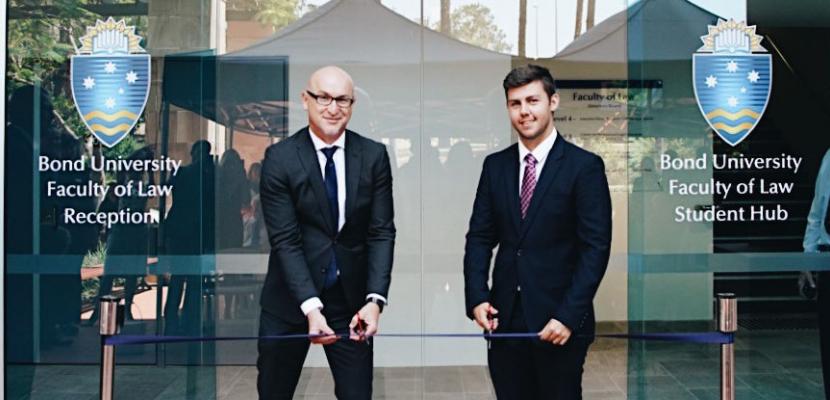
Bond University is ensuring its prestigious law program remains ahead of the curve, completing the Faculty's largest redevelopment in more than a decade to create flexible teaching and learning spaces that allow students to better collaborate and network.
The new facilities - officially opened today (Wednesday, 31 January) - include a showcase moot court, the third at the independent Gold Coast university, and additional space for Bond's community law clinics, along with 10 new teaching spaces, a new reception and foyer, an open-plan lounge, a student hub and offices for the three main law student associations.
The John and Alison Kearney Law Library has also been remodelled to facilitate more interaction between students, with both independent and group study areas included in the new design.
The Faculty has taken over space previously occupied by Bond University College, which has been relocated to another building on campus, increasing the Faculty’s floorspace by more than 1500sqm, making it the largest addition since the Legal Skills Building was completed in 2007.
Bond University Executive Dean of Law, Professor Nick James, said the new facilities would ensure the University continued to deliver the highest quality teaching and learning experience, and prepared students for the demands of a modern legal career.
"Our reputation as a high-quality law school is centred on our small class sizes, the personal attention our students receive, and the unparalleled access our students have to facilities such as the moot courtrooms and community legal clinics," he said.
"The modern lawyer needs to collaborate and network, so we have expanded the spaces available to students to study together, debate what they have learned in class or collaborate on projects so they can further develop these important interpersonal skills.
"Our new facilities set us apart in terms of the amount of space available to each student for this purpose. The resourcing of our classrooms is now matched by the resourcing of the areas where students spend time outside of the classroom.
"The focus is not on expanding our student numbers by attracting more students. We are committed to remaining a relatively small law school. It is about continuing to deliver a high-quality teaching and learning experience that best prepares our students for a career as a global legal professional."
Last year, the Faculty began limiting entry into its Bachelor of Law program to 180 students per year – around 60 per semester – to help manage the number of law graduates being produced and ensure it maintained its focus on the student experience.
Professor James said legal education had changed significantly over the past two decades, in response to the evolving requirements of the profession.
"In the past the most important thing was thought to be coming to class and reading law books, but there has been a shift in our understanding of how best to prepare law students to become lawyers," he said.
"We now understand that the learning that takes place outside the classroom can be just as important as what happens within the classroom, so creating spaces where students can gather and interact is essential.
"The law library too has evolved. As students predominately access resources online the library is no longer just a place to find books, it is also a place to get help from librarians and access flexible study areas."
The new showcase moot court includes a judges’ bench and courtroom furniture donated by long-time supporters of the University and Faculty, the Kearney family.
Dr John F Kearney AMQC and Dr Alison Kearney were foundation members of ‘Friends of Bond University’ and Dr Alison Kearney a member of the original Bond Foundation Committee. Their generosity has supported gifts of library resources, funding for prizes, buildings and travel scholarships. The John F Kearney Law Gold Medal is awarded to the most outstanding Law student each year in Dr Kearney's honour.
Professor James said the addition of the new showcase moot court and the new areas dedicated to community law clinics would provide students with more opportunities for practical experiences.
"Bond now offers three fully-functioning, authentic moot courtrooms, which is extremely rare - there are many law schools that do not have any," he said.
"We believe it is an essential experience for students to develop their skills in an environment that is as realistic as possible, giving them the opportunity to apply what they learn in class to a realistic trial situation.
"To stand up in front of a judge and answer questions can be extremely daunting, and many students say it is a formative experience and the highlight of their legal studies.
"The expansion of our legal clinics will also allow students to gain essential practical experience, while serving more members of the community.
"We now offer three clinics on campus providing advice for small businesses, families needing dispute resolution and people seeking immigration advice. Our students, working alongside qualified lawyers, have the opportunity to help real clients with real legal problems. There is really no better way to learn the law."
Bond University Vice-Chancellor and President, Professor Tim Brailsford, said continually investing in the University's facilities and programs was essential to maintaining its reputation for delivering Australia's best student experience and graduates who were well prepared for the workplace.
"At Bond University, we are always striving to stay ahead of the curve in terms of delivering an education that prepares our graduates to step straight from the classroom to the boardroom - or in the case of law, the courtroom," he said.
"We see this as an investment in the next generation of lawyers and in strengthening Bond's position as one of Australia's top-ranking law schools for student satisfaction and graduate outcomes."